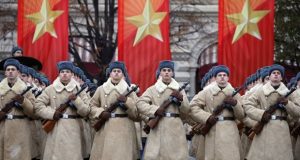
Russia is one of the oldest countries in the world with a very long and rich history. They use old and new calendars to mark important dates throughout the year for their people to remember and commemorate. The old calendar, known as Julian calendar, was widely used in Russia until 1918 to be replaced by the Gregorian calendar or Soviet Calendar. Both calendars are still used up until today, but Julian is 13 days behind of Gregorian.
In the new calendar, the holidays in Russia are marked in only five dates; January 22nd, May 1st and 2nd, then November 7th and 8th while the old calendar has nine holidays. Since Gregorian calendar is the one that is officially implemented in the Russia, the holidays are for public in general. This includes all schools, offices, and businesses. The holidays marked in Julian calendar that don’t appear in the new one are observed only by people who still use it like Orthodox Churches.
But what do these calendars have to do with the amazing history about the Day of Accord And Reconciliation in Russia? We are about to get there.
In November, according to Gregorian calendar, there are two dates marked as holidays; on the 4th and 7th. The 4th is a national holiday commemorated as The Unity Day (marked on October 22nd on the old calendar.) This holiday is served as a reminder of the day when Polish got expelled from Moscow after an uprising in November 1612. It is called The Unity Day because at that time the whole of Russian society stood up together, united, to preserve the Russian statehood without any guidance from a tsar or patriarch.
The Unity Day was celebrated until 1917 by the Russian Empire. In the same year, the empire was dismantled by the Soviet Union and tsarism was replaced by governance after a pair of revolutions in Russia. Therefore, the celebration of the Unity Day was replaced by the Revolution Day for this reason, and it was marked on the November 7th in the new calendar. But, in 2005, the Russian Federation restored the November 4th’s holiday of the Unity Day. For them who follow the Orthodox Church, the date is kept as the day of Our Lady of Kazan and also as a day to feast.
It can be safely said that the history of the day that we are going to understand here begins in 1917 when Vladimir Ilyich Lenin, or widely known as Lenin, the leader of The Bolshevik, ordered a revolution in Petrograd, St. Petersburg, to take over the Winter Palace and begin the control of the new Soviet state. The troop won the revolution, then Lenin changed the term of The Bolshevik to Communist. After Lenin’s death in 1924, Petrograd was renamed into Leningrad to honor him. Everyone in Russia who still belong to the Communist party definitely look up to Lenin. This explains how important the November 7th commemoration is to his followers.
In 1996, though, President Boris Yeltsin wanted to shift the memory of Revolution Day to a more positive atmosphere by changing the name to Day of Accord and Reconciliation. By doing this, he hoped that Russian people could see the date as the day to remember how the society should unify and know that they all have an equal past and future instead of the day where a lot of people died as victims of rebellion labeled as revolution. But of course, this sparked anger in the Communist party, considering the change as a dishonor to the Russian history. They carried out protests across Russia demanding Yeltsin’s resignation.
Leon Trotsky, a supporter of Lenin, provided a written lesson in the said revolution worth reading for everyone who wants to know what the revolution was all about because he was one of the important figures during those years. Theoretically, the revolution was carried out for a good cause; to tumble down the dominance of tsarism and release the people from tension so they can all have equal rights to a better way of life. But on the other hand, the Soviet Union post revolution also brought pain and terror to the people when Stalin was on charge. This, then, become the reason why some people think it is actually offensive to remember the November 7th as the Revolution Day.
This long and amazing history about the Day of Accord And Reconciliation in Russia surely has an effect to today’s people who live in the country. They often confuse the November 4th holiday with the 7th. A recent poll proved that only a very small number of Russians could correctly identify both dates. Most still thought of November 4th as the Unity Day and some as the Day of Accord and Reconciliation.
Though some people still think of the date as a disgrace to commemorate, every year it is still taken as a public holiday. A memorial military parade is hosted in the Red Square, while in other parts of the country was done in a solemn march. Veterans take the biggest part in the celebration because they are grateful to survive the revolution and still be alive to see the parade and experience life in Russia today. If there are people anyone should ask to deeply understand what the revolution was like and all about, they would be the Veterans and they are the sole reason why Revolution Day is worth to be remembered.
